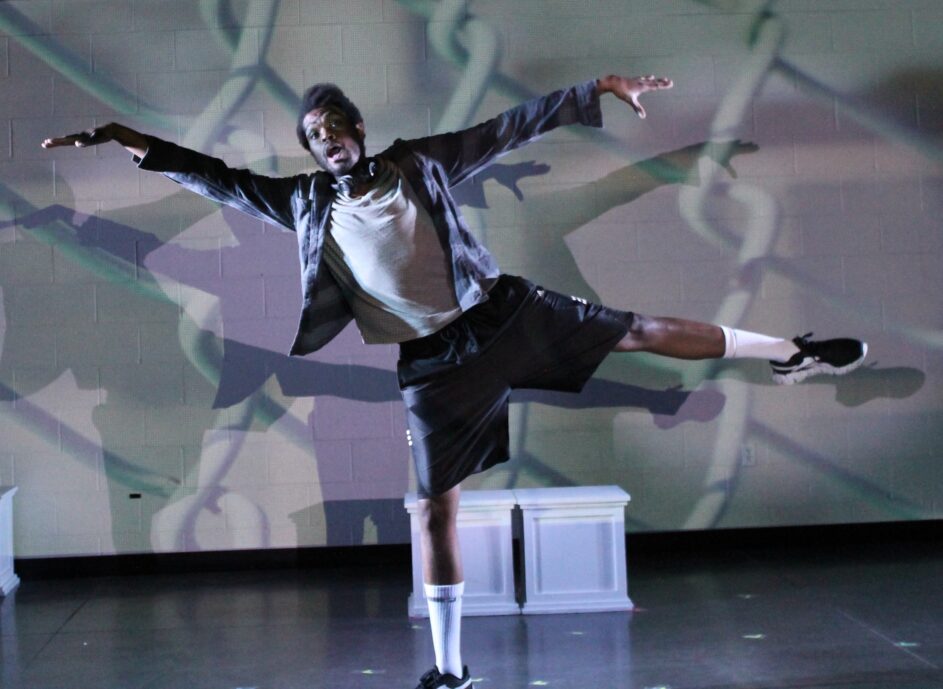There’s just no justifiable reason everyone in America, anyone in America, should have the phrase “I can’t breathe” seared into our collective consciences. But it’s there nevertheless, even for those for whom the meaning of the phrase is beyond their grasp. But especially for young Black people, the phrase is so immediate it may as well be printed on their foreheads.
Along with everyone else, I knew the phrase, of course. I watched the George Floyd murder trial. And I had strong reactions to the senselessness of three white men chasing down Ahmaud Arbery and his killing entirely without justification, not to mention the local authorities doing their best to ignore the matter until their hand was forced by the public posting video images.

Librettist Brandon J. Gibson
Breonna Taylor. Trayvon Martin. George Floyd, from whom the “I Can’t Breathe” phrase originated, and the 229 Black people killed by police since George Floyd’s murder, all added up to a reality that just could no longer be ignored by librettist Brandon Gibson, managing director of Knoxville’s Marble City Opera, who wrote the text and scenario for the world premiere of Marble City’s opera “I Can’t Breathe” presented at the Beck Cultural Exchange Center this past weekend to sold-out crowds, as well as streamed online for those unable to get physical tickets.
In addition to seeing opening night’s powerful performance that had many in the audience crying, Marble City was kind enough to send me a copy of the libretto so I could read Gibson’s skillful poetry as I replayed the singing and visual images in my head, preparing to write this piece. Hearing it all live I often missed the poetry and beauty of Gibson’s writing.
It was both calming and disturbing, watching Jayme Alilaw, who magisterially sang the role of The Mother, the first of six archetype characters who make up the monodramas of “Breathe,” as she went about the mundane task of folding laundry while she told the tragic story of the killing of her child, which has become so commonplace in America its shock value seems to have been replaced by the ordinariness of just another news story that shouldn’t have happened.
Instead of organizing it as an interacting group plot line, Gibson structured “Breathe” as six individual stories that represented types and categories of people in Black communities. Through Gibson’s writing, “I Can’t Breathe” took on a substantially broader meaning.
Following Alilaw’s The Mother was The Athlete, well sung and acted by Breyon Ewing as a high school basketball player shot by the police as he was pulling from his pocket the receipt for the things he was accused of stealing from the corner store. All it took was a scared cop yelling, “He’s got a gun!”
That was followed by Jacob Lay’s charming and playful portrayal of The Thug, a young non-stereotypical gay man who had taken the ways of the street to survive. He met the same inexplicable end. Benjamin Burney’s The Scholar, a college graduate luxuriating in having his own first apartment was accused of breaking in. Same senseless result!
Maurice Hendricks, as The Father, who simply wanted to take his family on a vacation trip but got stopped for a minor reason, met the same beyond-comprehension end. His wife, sung in by Laura Thomason, as The Lover, the only white character in the opera, sang about the overwhelming loss of her husband and father of their little girl, played by Avery Clayton, the only non-singing role in the opera.

Composer Leslie Savoy Burrs
Composer Leslie Savoy Burrs’ music for “I Can’t Breathe” functioned at times as a non-verbal Greek chorus, sometimes with rhythms that doubled the syllables being sung, sometimes with commentary that anticipated the words, or followed them, reinforcing the story. It skipped and flowed seamlessly through classical, jazz, pop and other idioms.
Certainly not an easy score to conduct because of its almost constant switching back and forth between styles, conductor Garrett McQueen did a masterful job of perfectly keeping singers and instrumentalists in pinpoint sync. McQueen is known to local public radio listeners as the former Afternoon Concert host on WUOT, as well as Knoxville Symphony bassoonist, but now is producer and host of TRILLOQUY, a weekly podcast that explores the many influences and contributions Black and other non-white composers and musicians have made to American cultural life.
In the end, the reality of the expression “I Can’t Breathe” is no longer just an anthem for horrible mistreatment and often criminal behavior by your police toward Black people. It’s about the totality of Black people’s collective inability to realize the potential and wholeness of American life because of both the blatant, and sometimes unconscious, ways they can’t be completely free.
“I Can’t Breathe” is a metaphor for all of it.
“I Can’t Breathe” was co-commissioned by the consortium of Pacific Opera Project in Los Angeles, and Opera Columbus and Cleveland Opera Theater in Ohio, where it will travel for regional premieres.
Harold Duckett is a designer, writer, art dealer/appraiser and president of Archaeform LLC, which handles residential architecture and interior design.

